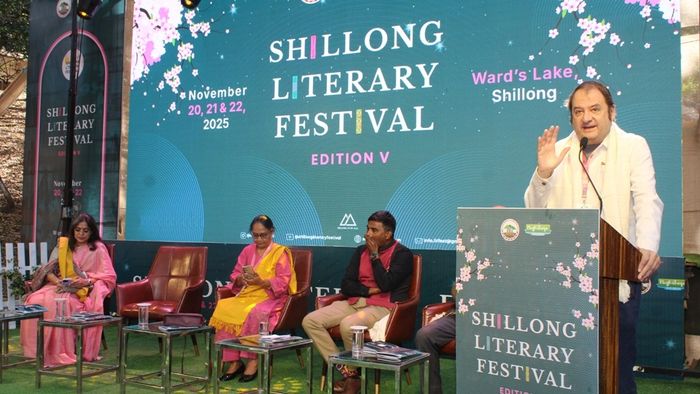Shillong literary festival opens with global line-up and new regional focus
International Booker Prize winner Banu Mustaq and Ikigai author Francesc Miralles led the inaugural session alongside festival curator Malavika Banerjee, Meghalaya Tourism Commissioner Vijay Kumar D, and Commissioner & Secretary Cyril VD Diengdoh.

- Nov 20, 2025,
- Updated Nov 20, 2025, 6:18 PM IST
Meghalaya’s biggest literary gathering opened its fifth edition on November 20 with a clear message: the stories of the state must travel far beyond its hills.
The Shillong Literary Festival returned to the banks of Ward’s Lake, now ringed with cherry blossoms, drawing writers from across India and abroad. The setting offered a striking backdrop for three days of discussions on literature, identity and the role of regional voices in a changing cultural landscape.
The state’s tourism department said the festival has grown into a space that fuels engagement among students and young writers. One official noted that the event has encouraged “a whole movement of engagement in colleges, schools, and institutions,” and urged visiting authors to “take our stories to the world.”
Booker International Prize honouree Banu Mushtaq set the tone for the festival, calling it a “Festival of Imagination.” Speaking about the city’s place in the national creative consciousness, she said standing in Shillong felt like “walking into a page that has been quietly waiting for me,” adding that the hills remain “a reminder of how deeply stories connect us.”
Spanish writer Francesc Miralles traced his own journey to literature back to India, saying his first trip in the late 1990s pushed him towards writing. “Without India, I would never have written books,” he said.
Festival curator Malvika Banerjee highlighted expanding local-language programming, especially Khasi and Garo sessions. She recalled hearing a Garo poem during her first visit and said the inclusion of indigenous voices was essential: “If we don’t have these sessions here in these languages, then… it will not really represent the state.”
The opening day saw the release of three books — Wad Shwa La Ka Tynrai by Streamlet Dkhar, Songs of Our People by Anurag Banerjee, and Is She Wise by Monica Thomas, Gladinia Pyrtuh and Anthony Durpui — reflecting the festival’s blend of regional and national perspectives.
A series of conversations followed, featuring discussions on the influence of Japanese philosophy on Ikigai, the origins of the Dibrugarh boat clinic project, and a reflective session on myths and memory. Readings, live drawing, and a segment on Himalayan folklore added to the day’s pace.
Children’s literature also found space, with a session on Is She Wise exploring Biate folktales and women’s wisdom. Another discussion, titled Heal The World, brought together Jerry Pinto and Neena Verma for a candid exchange on grief, empathy and mental health.
Later, writer Sam Dalrymple spoke about the partitions that reshaped Asia, while Mushtaq revisited her award-winning collection Heart Lamp.
The day closed with a panel on taking Khasi literature to wider audiences, followed by a performance by musicians from the Meghalaya Grassroots Music Project.
The festival continues for two more days with sessions on translation, climate, poetry, indigenous storytelling and global publishing trends.